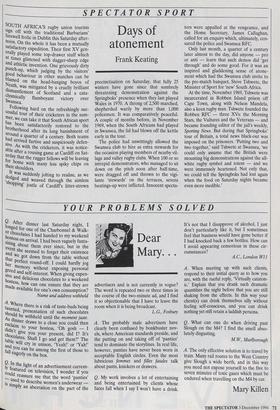SPECTATOR SPORT
Days of atonement
Frank Keating
SOUTH AFRICA'S rugby union tourists Sign off with the traditional Barbarians' farewell frolic in Dublin this Saturday after- noon. On the whole it has been a mutually satisfactory expedition. Their first XV gen- erally played some top-drawer stuff which at times glistened with dagger-sharp edge and athletic invention. One grievously dirty punch-up, which judging by the visitors' good behaviour in other matches can be blamed on the head-banging boyos of Neath, was mitigated by a cruelly brilliant dismantlement of Scotland and a cata- clysmically flamboyant victory over Swansea.
Following hard on the refreshingly suc- cessful tour of their cricketers in the sum- mer, we can take it that South African sport has been satisfactorily restored to the brotherhood after its long banishment of around a quarter of a century. Both teams had arrived furtive and suspiciously defen- sive. As with the cricketers, it was notice- able after a rousing game at Cardiff on Sat- urday that the rugger fellows will be leaving for home with many less spiky chips on their shoulders. It was suddenly jolting to realise, as we dodged and weaved through the aimless shopping -, jostle of Cardiff's litter-strewn precinctisation on Saturday, that fully 25 winters have gone since that sombrely threatening demonstration against the Springboks' presence when they last played Wales in 1970. A throng of 2,500 marched, shepherded warily by more than 1,000 policemen. It was comparatively peaceful. A couple of months before, in November 1969, when the South Africans had played in Swansea, the lid had blown off the kettle early in the tour. The police had unwittingly allowed the Swansea club to hire as extra stewards for the occasion playing members of nearby vil- lage and valley rugby clubs. When 100 or so intrepid demonstrators, who managed to sit down on the pitch soon after half-time, were dragged off and thrown to the vigi- lante 'stewards' on the terraces, severe beatings-up were inflicted. Innocent specta- tors were appalled at the vengeance, and the Home Secretary, James Callaghan, called for an enquiry which, ultimately, cen- sured the police and Swansea RFC.
Only last month, a quarter of a century later almost to the day, did anyone — pro or anti — learn that such demos did 'get through' and do some good. For it was an inspired and gladdening sense of atone- ment which had the Swansea club invite to the pre-match banquet, Steve Tshwete, the Minister of Sport for 'new' South Africa.
At the time, November 1969, Tshwete was incarcerated in Robben Island prison off Cape Town, along with Nelson Mandela, also a keen rugby man. Tshwete founded the Robben RFC — three XVs: the Morning Stars, the Vultures and the Veterans — and became founding editor of the jail's weekly, Sporting News. But during that Springboks' tour of Britain, a total news black-out was imposed on the prisoners. 'Putting two and two together,' said Tshwete at Swansea, 'we could only assume that the British were mounting big demonstrations against the all- white rugby symbol and totem — and we were immensely heartened. Not only that, we could tell the Springboks had lost again when the food on Saturday nights became even more inedible.'










































































 Previous page
Previous page